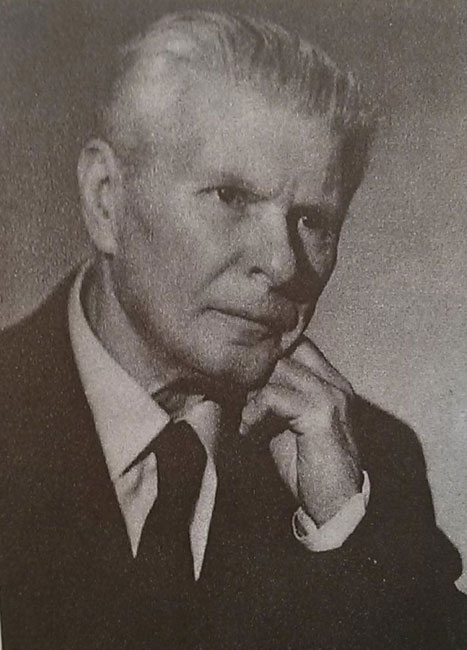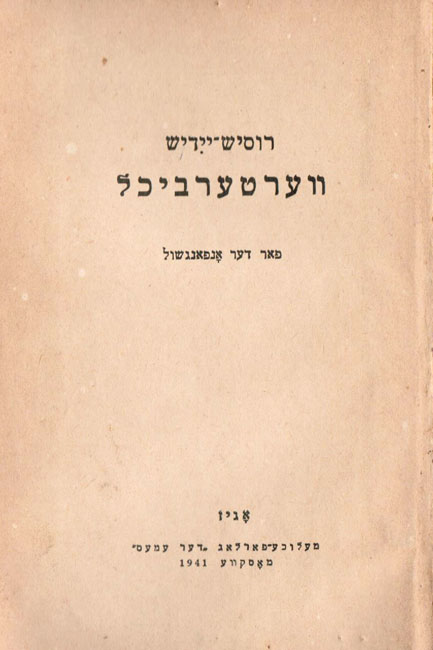Eli Falkovich was born in Gomel in 1898. At some point in the 1930s he graduated from the faculty of linguistics of the University of Moscow. While he was still a student, he began to teach Yiddish at the Communist University of the Peoples of the West. In the 1930s also he lectured at the department of Yiddish studies of the Second Moscow University. He published works on Yiddish linguistics and was the author of Yiddish textbooks and dictionaries. His book Yiddish, about the phonetics, vocabulary, and grammar of the language was published in 1940 and in the following year his Russian-Yiddish dictionary for primary schools.
On July 6, 1941, soon after Nazi Germany invaded the USSR, Falkovich volunteered to join the Narodnoe opolchenie (a kind of national guard). Subsequently, as a member of the regular Red Army, in the fighting around Moscow under heavy enemy mortar fire, while serving as a medical instructor in an infantry division, Falkovich provided medical aid to the wounded. In October 1941 he evacuated from the battlefield 52 Red Army men with their weapons (medics in the Red Army had to save not only people but also to salvage their weapons, which the Soviets were in great need of; otherwise, the medic would be severely punished). In fighting on November 28-29 Falkovich evacuated 34 more men with their weapons.
On December 1, 1941 German forces, after breaking through Soviet defense lines, captured the whole medical unit with which Falkovich was serving (the previous day their commanders had taken away their weapons and given them to Red Army men who had just arrived at the front). Falkovich succeeded in ripping up photographs he had with him, including ones of his children, and his identification papers. He did not look like a Jew. Furthermore, although he knew German well, he pretended that he didn't understand the language. All of the captured Soviet troops were put into the animal pen of a former Soviet state farm near Moscow while the seriously wounded POWS were shot to death. When a shell fired by the Soviets at the German position happened to hit the animal pen, Falkovich took advantage of the confusion and escaped by hiding in a shed. On the following day a Red Army unit approached the farm. Greeting them, Falkovich informed them about the disposition of the Germans there and took part in the attack against the enemy. As a result of the attack 37 Germans were taken prisoner. For this, in July 1942, Falkovich was awarded the Order of Lenin.
Later he became a military translator and, with the rank of senior lieutenant, he interrogated German POWs, as well as carrying out other assignments of military translators. From 1943 to 1948 he was a member of the Jewish Anti-fascist Committee and an editor of Chernaia kniga (The Black Book).
After Stalin's destruction of Yiddish culture in 1949, Falkovich turned to lecturing. With the appearance in 1961 in Moscow on the Yiddish journal Sovetish heymland, he published there articles of the stylistics of literary Yiddish. His lessons in Yiddish, which were published in the journal, played a role in raising the ethnic consciousness of a number of Soviet Jews. Eli Falkovich died in 1979. His article on Yiddish appeared posthumously as the introduction to The Russian-Yiddish Dictionary published in Moscow in 1984.
Eli Falkovich's speech at the Jewish anti-fascist meeting
In a speech he delivered at the Jewish anti-fascist meeting Falkovich said:
"That great villain Hitler did not understand that Soviet Jews not only wrote… their own history but also learned how to make history. This is why, when on June 22, 1941, our peaceful work was interrupted by Hitler's hordes, we Soviet Jews, old and young, men and women, with rifle in hand, were in the first ranks of fighters for our homeland, led by the Russian people, the people of Tolstoy. Every one of us took the Jewish oath 'may my right hand wither if I forget you, my country' [a paraphrase of the line from the book of Psalms, 37 " If I forget you, O Jerusalem," may my right hand wither].
And there burned within us the flame of the Macabbees and we wrought miracles. Who does not know the names of the Heroes of the Soviet Union General Kreizer, Captain Fisanovich, Gorelik, Diskin, and many other Jewish heroes, whose names adorn the lists of those honored and whose portraits have such an honorable place in the gallery of heroes of the [Great] Patriotic War. And how many thousands of unknown Jewish heroes there are, both those alive and those who sacrificed their lives to help stop the enemy…?"
From: GARF 8114-1-160, copy YVA JM/26142
Ilya Ehrenburg about Eli Falkovich
Ilya Ehrenburg published his article "Jews" in the main Red Army newspaperKrasnaia zvezda (Red Star) on November 1, 1942. In the article Ehrenburg mentioned several Soviet Jewish iconic heroes, such as Chaim Diskin, Leizer Papernik, Israel Fisanovich and others. But the first in the list was Eli Falkovich, whose heroic story was probably somewhat exaggerated. Ehrenburg began the article with words:
"The Germans tortured young Jewish women and buried elderly Jews alive. Hitler wanted to make a target out of Jews. Jews showed him that a target shoots back. Jews had been scientists and workers, musicians and longshoremen, doctors and farmers. Jews became soldiers. They will not hand over to anyone their right for revenge.
Falkovich was over 40. He was a philologist and had spent his life at a desk. Germans lick their lips over such types: catch and hang them. Cut off from his unit, he pulled 18 soldiers together. They confronted an enemy company. Falkovich ordered: 'Attack!' Eighteen brave souls captured 35 fritzes. The philologist killed eight Germans with his own hands."
From: Joshua Rubenstein, "Il'ia Ehrenburg and the Holocaust in the Soviet Press," in Harriet Murav and Gennady Estraikh, eds., Soviet Jews in World War II: Fighting, Witnessing, Remembering, Boston: Academic Studies Press, 2014, p. 40.








